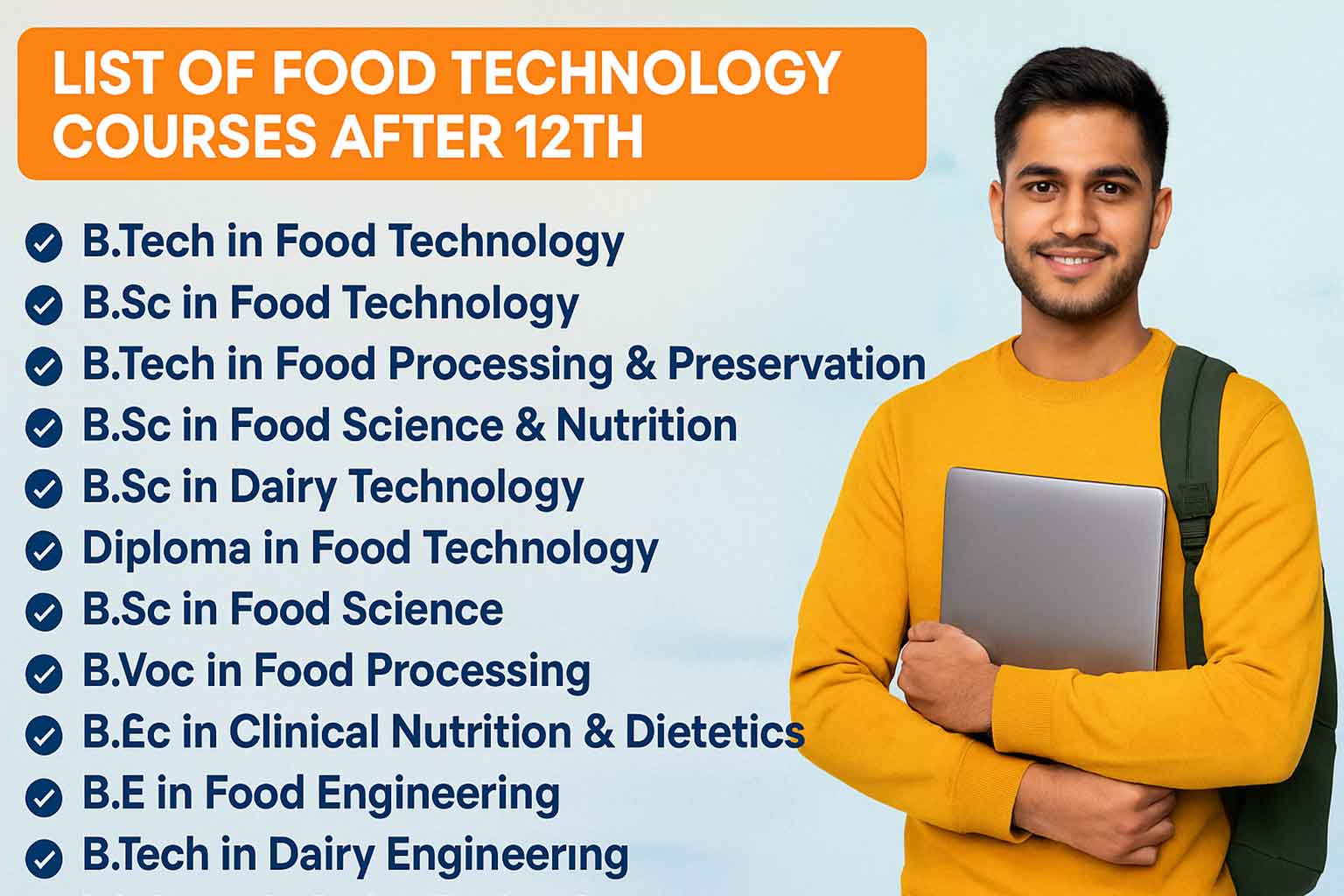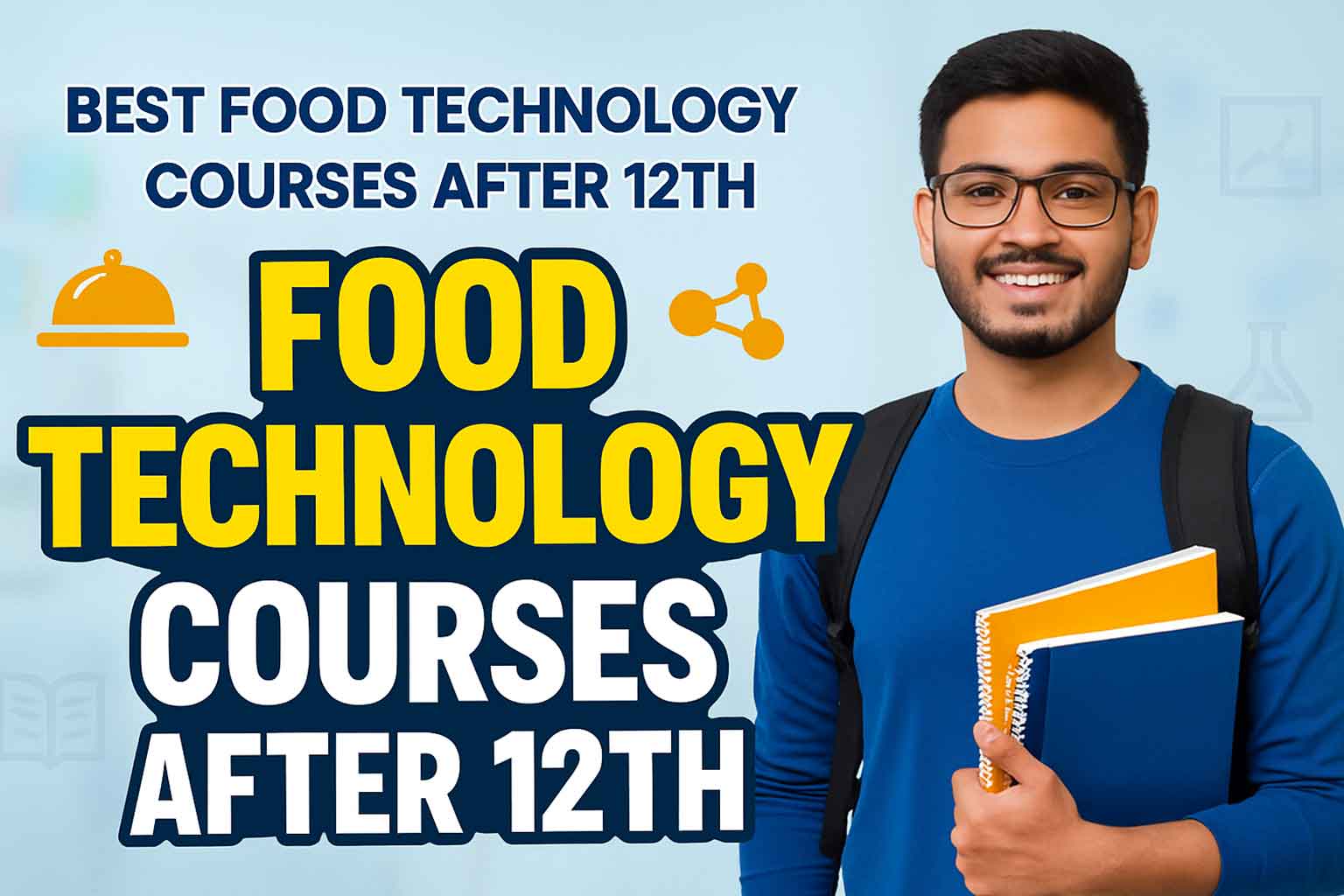Welcome to CoursesAfter.com! If you’re a 12th-grade student with a passion for science and a curiosity about what goes into the food we eat, you’ve landed in the right place. Have you ever wondered how your favorite packaged snacks stay fresh for so long, or how new flavors are invented? The answer lies in the dynamic and innovative world of food technology. Choosing a career path after 12th can be daunting, but a food technology course after 12th could be the perfect blend of science, creativity, and a stable career. This detailed guide will walk you through everything you need to know to make an informed decision about your future in this exciting field.
What are Food Technology Courses?
Food Technology is an applied science that combines the principles of chemistry, microbiology, engineering, and nutrition to study the processes involved in food production, preservation, quality control, packaging, and distribution. Food technology courses are designed to equip students with the knowledge and skills to create new, healthy, and safe food products, ensuring they meet industry standards and consumer demands. The curriculum typically covers everything from the chemical composition of food to the design of food processing plants. It’s a field that is constantly evolving to meet global challenges like food security, sustainability, and public health.
Why Choose Food Technology Courses After 12th?
Choosing a food technology course after 12th opens up a world of opportunities. The food industry is one of the largest and most stable industries globally, which means there’s always a demand for skilled professionals. Here are a few key reasons to consider this career path:
- Growing Demand: With the rise of processed foods, global supply chains, and a growing focus on health and nutrition, the demand for food technologists, scientists, and inspectors is consistently high.
- Diverse Career Opportunities: The field isn’t limited to food production. You can work in quality assurance, research and development, food safety regulation, marketing, and even entrepreneurship.
- Innovation and Creativity: Food technology is a hub for innovation. You can be at the forefront of developing new products, improving nutritional value, and creating sustainable food systems.
- Job Security: The food industry is resilient to economic downturns because people always need to eat. This translates to excellent job security for qualified professionals.
- High-Impact Role: As a food technologist, you play a vital role in ensuring the food on our plates is safe, healthy, and delicious. You are directly contributing to public health and consumer well-being.
List of Food Technology Courses After 12th

Here are 20 popular food technology courses you can pursue after completing your 12th grade, complete with details on their eligibility, career options, fees, and salary expectations.
B.Tech in Food Technology
- Duration: 4 years
- Eligibility: 10+2 with Physics, Chemistry, and Mathematics (PCM) or Physics, Chemistry, and Biology (PCB) with a minimum of 50% aggregate marks
- Career Options: Food Technologist, Quality Assurance Manager, Production Manager, Research Scientist
- Fees: ₹1.5 to 10 Lakhs (total course fee)
- Salary Range: ₹3 to 8 LPA
B.Sc in Food Technology
- Duration: 3 years
- Eligibility: 10+2 with Science stream (PCM/PCB) with a minimum of 50% aggregate marks
- Career Options: Food Scientist, Quality Controller, Laboratory Technician, Product Development Executive
- Fees: ₹50,000 to 5 Lakhs (total course fee)
- Salary Range: ₹2.5 to 6 LPA
B.Tech in Food Processing & Preservation
- Duration: 4 years
- Eligibility: 10+2 with Physics, Chemistry, and Mathematics with a minimum of 50% marks
- Career Options: Food Processing Engineer, Quality Manager, Food Safety Officer, Researcher
- Fees: ₹2 to 8 Lakhs
- Salary Range: ₹3.5 to 7 LPA
B.Sc in Food Science & Nutrition
- Duration: 3 years
- Eligibility: 10+2 with Science stream (PCB) with a minimum of 50% marks
- Career Options: Nutritionist, Dietician, Food Analyst, Public Health Officer
- Fees: ₹1 to 5 Lakhs
- Salary Range: ₹2.5 to 6 LPA
B.Sc in Dairy Technology
- Duration: 3 years
- Eligibility: 10+2 with Physics, Chemistry, and Mathematics/Biology
- Career Options: Dairy Technologist, Quality Control Manager, Dairy Plant Supervisor, Dairy Consultant
- Fees: ₹80,000 to 4 Lakhs
- Salary Range: ₹3 to 7 LPA
Diploma in Food Technology
- Duration: 1 to 3 years
- Eligibility: 10th or 12th pass (depending on the institution) with a minimum of 50% marks
- Career Options: Food Processing Technician, Quality Control Assistant, Food Lab Technician
- Fees: ₹20,000 to 2 Lakhs
- Salary Range: ₹2 to 4 LPA
B.Sc in Food Science
- Duration: 3 years
- Eligibility: 10+2 with Science stream (PCB/PCM) with a minimum of 50% marks
- Career Options: Food Scientist, Sensory Scientist, Food Inspector, Food Researcher
- Fees: ₹1 to 5 Lakhs
- Salary Range: ₹2.5 to 6.5 LPA
B.Voc in Food Processing
- Duration: 3 years
- Eligibility: 10+2 in any stream
- Career Options: Production Supervisor, Food Quality Inspector, Food Processing Assistant
- Fees: ₹60,000 to 3 Lakhs
- Salary Range: ₹2 to 4.5 LPA
B.Sc in Clinical Nutrition & Dietetics
- Duration: 3 years
- Eligibility: 10+2 with Science stream (PCB)
- Career Options: Clinical Dietician, Nutrition Consultant, Health Educator, Public Health Nutritionist
- Fees: ₹1 to 6 Lakhs
- Salary Range: ₹3 to 7 LPA
B.E in Food Engineering
- Duration: 4 years
- Eligibility: 10+2 with Physics, Chemistry, and Mathematics (PCM)
- Career Options: Food Engineer, Production Engineer, Process Manager
- Fees: ₹3 to 10 Lakhs
- Salary Range: ₹4 to 9 LPA
B.Sc in Hotel Management & Catering Technology
- Duration: 3 years
- Eligibility: 10+2 in any stream
- Career Options: Chef, Food and Beverage Manager, Catering Manager
- Fees: ₹2 to 8 Lakhs
- Salary Range: ₹3 to 7 LPA
B.Tech in Dairy Engineering
- Duration: 4 years
- Eligibility: 10+2 with Physics, Chemistry, and Mathematics (PCM)
- Career Options: Dairy Plant Manager, Dairy Engineer, Quality Assurance Specialist
- Fees: ₹1 to 6 Lakhs
- Salary Range: ₹3.5 to 8 LPA
B.Sc in Fisheries Science
- Duration: 3 years
- Eligibility: 10+2 with Science stream (PCB)
- Career Options: Fisheries Officer, Aquaculture Scientist, Seafood Technologist
- Fees: ₹50,000 to 3 Lakhs
- Salary Range: ₹2.5 to 6 LPA
Diploma in Dairy Technology
- Duration: 1 to 2 years
- Eligibility: 10+2 with Physics, Chemistry, and Mathematics/Biology
- Career Options: Dairy Plant Operator, Quality Tester, Milk Procurement Supervisor
- Fees: ₹30,000 to 1.5 Lakhs
- Salary Range: ₹2 to 4 LPA
B.Sc in Food Processing & Quality Management
- Duration: 3 years
- Eligibility: 10+2 with Science stream
- Career Options: Food Quality Auditor, Food Safety Specialist, Quality Control Officer
- Fees: ₹1 to 4 Lakhs
- Salary Range: ₹3 to 6 LPA
Certificate in Bakery & Confectionery
- Duration: 6 months to 1 year
- Eligibility: 10th or 12th pass
- Career Options: Baker, Pastry Chef, Entrepreneur
- Fees: ₹20,000 to 1 Lakh
- Salary Range: ₹1.8 to 4 LPA
B.Tech in Agricultural & Food Engineering
- Duration: 4 years
- Eligibility: 10+2 with Physics, Chemistry, and Mathematics (PCM)
- Career Options: Agricultural Engineer, Food Processing Engineer, Farm Manager
- Fees: ₹2 to 8 Lakhs
- Salary Range: ₹3.5 to 8.5 LPA
Diploma in Food & Beverage Service
- Duration: 1 to 2 years
- Eligibility: 10th or 12th pass
- Career Options: F&B Manager, Service Staff, Restaurant Supervisor
- Fees: ₹25,000 to 1.5 Lakhs
- Salary Range: ₹2 to 4 LPA
B.Sc in Nutrition & Dietetics (Integrated)
- Duration: 5 years
- Eligibility: 10+2 with Science stream
- Career Options: Dietician, Nutritionist, Health Counselor, Researcher
- Fees: ₹1.5 to 6 Lakhs
- Salary Range: ₹3 to 7 LPA
Diploma in Food Production
- Duration: 1 to 2 years
- Eligibility: 10th or 12th pass
- Career Options: Cook, Chef, Kitchen Supervisor
- Fees: ₹30,000 to 2 Lakhs
- Salary Range: ₹2 to 4.5 LPA
Food Technology Courses Fees After 12th
The fees for a food technology course after 12th can vary significantly based on the type of course (diploma, bachelor’s), the college (government or private), and the location. Here’s a general overview in a table format, arranged by popularity.
| Course Name | Average Fees (Total Course) |
| B.Tech in Food Technology | ₹4 to 8 Lakhs |
| B.Sc in Food Technology | ₹2 to 4 Lakhs |
| B.Tech in Food Processing & Preservation | ₹3 to 6 Lakhs |
| B.Sc in Food Science & Nutrition | ₹1.5 to 4 Lakhs |
| B.Sc in Dairy Technology | ₹1.5 to 3 Lakhs |
| Diploma in Food Technology | ₹50,000 to 1.5 Lakhs |
| B.Sc in Food Science | ₹1.5 to 4 Lakhs |
| B.Voc in Food Processing | ₹1 to 2.5 Lakhs |
| B.Sc in Clinical Nutrition & Dietetics | ₹2 to 5 Lakhs |
| B.E in Food Engineering | ₹5 to 9 Lakhs |
| B.Sc in Hotel Management & Catering Technology | ₹3 to 7 Lakhs |
| B.Tech in Dairy Engineering | ₹2 to 5 Lakhs |
| B.Sc in Fisheries Science | ₹1 to 2.5 Lakhs |
| Diploma in Dairy Technology | ₹40,000 to 1 Lakh |
| B.Sc in Food Processing & Quality Management | ₹1.5 to 3.5 Lakhs |
| Certificate in Bakery & Confectionery | ₹30,000 to 80,000 |
| B.Tech in Agricultural & Food Engineering | ₹3.5 to 7 Lakhs |
| Diploma in Food & Beverage Service | ₹40,000 to 1.2 Lakhs |
| B.Sc in Nutrition & Dietetics (Integrated) | ₹2 to 5.5 Lakhs |
| Diploma in Food Production | ₹40,000 to 1.5 Lakhs |
Top Food Technology Courses After 12th with Salary
Salary prospects for food technology graduates are promising and depend on the course, job role, and experience. Here’s a look at the average starting salary for some of the top courses.
| Course Name | Average Starting Salary (per annum) |
| B.Tech in Food Technology | ₹4 to 6 LPA |
| B.E in Food Engineering | ₹4 to 7 LPA |
| B.Tech in Dairy Engineering | ₹3.5 to 6 LPA |
| B.Tech in Agricultural & Food Engineering | ₹3.5 to 6 LPA |
| B.Sc in Clinical Nutrition & Dietetics | ₹3 to 5 LPA |
| B.Sc in Food Science & Nutrition | ₹3 to 5 LPA |
| B.Sc in Food Technology | ₹3 to 5 LPA |
| B.Tech in Food Processing & Preservation | ₹3 to 5 LPA |
| B.Sc in Dairy Technology | ₹3 to 5 LPA |
| B.Sc in Food Processing & Quality Management | ₹3 to 4.5 LPA |
| B.Sc in Food Science | ₹2.5 to 4.5 LPA |
| B.Sc in Fisheries Science | ₹2.5 to 4 LPA |
| B.Voc in Food Processing | ₹2.5 to 4 LPA |
| B.Sc in Hotel Management & Catering Technology | ₹3 to 5 LPA |
| Diploma in Food Technology | ₹2 to 3.5 LPA |
| Diploma in Food Production | ₹2 to 3 LPA |
| Diploma in Dairy Technology | ₹2 to 3 LPA |
| Diploma in Food & Beverage Service | ₹2 to 3 LPA |
| Certificate in Bakery & Confectionery | ₹1.8 to 3 LPA |
Entrance Exams for Food Technology After 12th
Admission to food technology courses, especially at the B.Tech level, is often based on entrance exam scores. The exams test students’ knowledge in subjects like Physics, Chemistry, Biology, and Mathematics. Some of the popular entrance exams are:
- JEE Main
- ICAR AIEEA
- MHT CET
- TNEA
- CUET (Common University Entrance Test)
- WBJEE
- EAMCET
Top Colleges & Institutes in India
India has numerous institutions offering excellent food technology programs. These colleges are known for their strong academics, state-of-the-art labs, and good placement records. Here are some of the top institutions:
- National Institute of Food Technology, Entrepreneurship and Management (NIFTEM), Sonepat
- Indian Institute of Technology (IIT), Kharagpur
- Institute of Chemical Technology (ICT), Mumbai
- Jadavpur University, Kolkata
- National Institute of Technology (NIT), Rourkela
- Indian Institute of Food Processing Technology (IIFPT), Thanjavur
- Anand Agricultural University, Gujarat
- Punjab Agricultural University, Ludhiana
- Amity University, Noida
- Lovely Professional University (LPU), Jalandhar
- University of Delhi
- Harcourt Butler Technical University (HBTU), Kanpur
- SRM Institute of Science and Technology, Chennai
- Chandigarh University
- Nirma University, Ahmedabad
Conclusion
Choosing a food technology course after 12th can be a great decision for students who are fascinated by the science behind our food. With a wide array of courses, from diplomas to B.Tech degrees, and a multitude of career options in a stable and growing industry, this field offers both job security and the chance to make a real impact. Whether you’re interested in developing new products, ensuring food safety, or managing large-scale production, a career in food technology is both rewarding and full of potential. We hope this guide helps you in making the right choice for your future. Best of luck on your academic journey!

